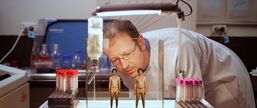The documentary is about a sugar experiment by Australian director and actor Damon Gameau. Damon has been on a (refined) sugar-free diet for 5 years, with the help of a team of pathologists, nutritionists and other professionals, for 2 months, he maintained his previous low-fat diet and exercise, At the same time, consume 40 teaspoons (about 160g) of sugar a day and observe your own changes.
The first thing this documentary wants to tell us is that sugar is hidden everywhere in our lives, including those that seem healthy .
40 teaspoons a day sounds like a lot, but that's just the average Australian. And experts told Damon that to achieve this intake, he does not actually need to eat a lot of junk food such as candy, soda, chocolate, ice cream, etc. He can easily consume enough sugar through those recognized "healthy foods and beverages" .
On the first day of the experiment, his breakfast consisted of two small cups of cereal, a cup of yogurt, and 400ml of apple juice, which actually contained 20 teaspoons of sugar! He had to go on a diet for the next two meals.
20 teaspoons may sound like no concept. If you directly ingest the same amount of white sugar, the scene is like this-
A cup of healthy fruit smoothie that claims to use only real good fruit to create a natural taste contains 139g of sugar. If you want to eat the same amount of sugar by eating fruit, you need to eat 4 peaches, 9 limes, 30 lemons, 30 strawberries—
By the twelfth day of the experiment, Damon's weight had increased by 3.2 kilograms. What's more, these meats grow on his waist (same as classmate Zhichong!), which is converted into visceral fat, and too much visceral fat can easily lead to metabolic diseases. At the same time, the level of alanine aminotransferase in his blood increased, which meant his liver cells were being damaged or necrotic - within just two or three weeks, he began to show signs of fatty liver. This result surprised Damon, and the second thing he wanted to understand was how exactly does sugar affect our bodies?
The documentary uses a vivid animation to explain the story of what happens to sugar in the human body: sugar enters the body and is broken down into two parts, fructose and glucose. After the two sugars enter the liver, glucose is quickly converted into energy or stored for later use, but the liver has no mechanism to process fructose, so fructose will leave the blood, and if the body has enough stored sugar, then fructose will Converts quickly to fat. In addition, a large amount of glucose in the blood will cause the body to secrete a large amount of insulin , and insulin will make the cells retain fat, which is equivalent to stopping fat burning.
So, eating a lot of sugar and foods that can cause a rapid rise in the glycemic index can make you gain weight. On top of that, it can make you sick : After fructose is converted to fat, some of the fat stays in the liver, which can lead to insulin resistance or diabetes, and some of the fat goes into the bloodstream and turns into triglycerides esters, while triglycerides contribute to obesity, clogged arteries and heart disease.
In addition, under a high-sugar diet, Damon's food intake has also increased due to insufficient intake of high-quality fat and protein, making it difficult to feel full . This reminds me of a joke circulating on the Internet. Salad is divided into two parts. Most people only eat the "edible part" above - potatoes, pumpkin, purple potato, corn, cherry tomatoes, chicken breast, etc., and the "inedible part" below. ” - kale, chrysanthemum, lettuce, either don’t eat (and then get so hungry to eat something else, or lose it in a few days), or pour a full salad dressing or oil Eat with vinegar sauce (also high in calories).
It wasn't just physical effects, Damon felt like his own mentality was starting to change as well :
It turns out that glucose maintains the operation of the brain. If the content of glucose keeps fluctuating, the mental state of a person will be unstable . After a lot of sugar intake, the body will release insulin, insulin will bring the sugar into the cells, and the blood sugar will drop rapidly, which will make the brain lose the feeling of pleasure. At this time, the body will release stress hormones such as adrenaline, and these hormones will be sent to the brain. Signal, let people eat some foods high in sugar. Repeat this.
Regular consumption of sugary foods allows the brain to build habits. When we receive stimuli, such as seeing a real milkshake or a photo, the brain releases dopamine, which tells people: "Eat it, you need sugar for quick energy and a good mood." When we eat sugary foods, the brain secretes opioids and beta-endorphins, which make us feel good. When we regularly eat sugary foods and establish this pleasure-rewarding mechanism, we are easily attracted to sugary foods and fall into a vicious cycle. In other words, the more high-sugar foods you eat, the stronger your cravings for high-sugar foods.
It is generally believed that fat is more terrible than sugar, or that it is enough to increase the amount of exercise and maintain a balance of intake and consumption after eating high-sugar foods. But this is not the case. Before and after the experiment, the calories in Damon's diet were similar. The avocados he ate before were higher in fat, and the calories from fat were higher than that of sugar (9 calories per gram of fat and only 4 calories per gram of sugar), but the experiment Later, Damon's liver fat content increased. After the 2-month experiment, he gained 8.5kg in weight, 10cm in waist circumference, developed fatty liver and tended to cirrhosis, and was about to develop insulin resistance…
After the experiment, Damon simply resumed his usual eating habits: replacing cereal and low-fat yogurt with bacon, eggs, and avocado, switching snacks from nut bars to nuts and cheese, eating fish and meat without deliberately removing fat, Eat lots of vegetables. In this way, without much exercise, he lost 6kg, and the blood test results returned to normal.
Damon concluded that sugar does not contain the same calories as other foods . Therefore, the reason for sugar control is not simply to control calorie intake , but also because sugar has various unexpected negative effects on us on both the physiological and spiritual levels. As the panel concluded: "It's not the calories that cause obesity, it's the source of the calories."
In the past, I saw female stars say that controlling sugar can slow down aging, but the classmate Zhichong was unmoved. People are always going to age, and between fighting an inevitable process (not sure how effectively) and enjoying deliciousness, I choose to be on the delicious side. But after watching this documentary, it turns out that the harm of sugar is much more than that of Hongyan! In addition, it should be emphasized that the sugar control should be refined sugar, and the sugar in normal food can be eaten normally in moderation.
It’s better not to eat refined sugar, and it’s better to eat less than more. Of course, I think it’s better not to eat it until I lose the five pounds I gained from eating fruit recently... I suggest everyone to watch this movie, so that in the future When you are attracted by carefully processed desserts and drinks, you can wake up immediately. This is a signal that your brain and body are being deceived !
———————————————————————————
From No. ?: "The Talking About Insects", watching the movie丨The reason why I have gained five pounds recently
If you find it interesting, please come to the public account "Zhi Zong Shuo" to chat/play with me.
View more about That Sugar Film reviews











